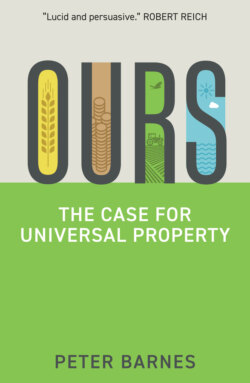Ours

Реклама. ООО «ЛитРес», ИНН: 7719571260.
Оглавление
Peter Barnes. Ours
CONTENTS
Guide
List of Illustrations
Pages
Ours. The Case for Universal Property
Acknowledgments
Foreword
Author’s Note
1 What is Universal Property?
What is it?
Notes
2 Why Markets Fail
The three market failures
Notes
3 Twenty-First-Century Realities
Notes
4 The Jobs of Universal Property
How universal property would work
Trusts
Universal beneficiaries
Birthrights
Usage and non-usage rights
What about government?
A tour of the territory
The Alaska Permanent Fund
Land trusts
Worker ownership funds
Sovereign wealth funds
Social wealth funds
Cap and dividend
Personhood for nature
The public trust doctrine
Notes
5 Interlude for Imagination
Polyopoly
Gaiaopoly
Googleopoly
Notes
6 Universal Money Pumps
Universal property and taxes
A social wealth fund
Make polluters pay
Make oligopolies pay
Make speculators pay
A universal inheritance fund
Helicopter money for all
Universal property and taxes, again
Brief case
Objections
We can’t afford it
Universal income promotes individual consumption over public investment
Universal income will be inflationary
Universal income will undermine the work ethic
Giving money to people who don’t need it is wasteful
Universal property diminishes the role of government
Notes
7 Toll Gates at Nature’s Edges
Objections
Ecological limits will make us poorer
A trusteeship system can be compromised too
What about all the other things we must do to save the planet? Aren’t they more important than this?
Notes
8 The Politics of Universal Property
Prospects
What about scale?
Notes
9 The Adjacent Possible
Notes
Select Bibliography
Full spectrum
Classics
Property rights
Common wealth
Inequality
Money, debt, and finance
Markets and nature
Basic income, social wealth funds, and inheritances
The economy as a complex system
Index
A
B
C
D
E
F
G
H
I
J
K
L
M
N
O
P
Q
R
S
T
U
V
W
Y
Z
POLITY END USER LICENSE AGREEMENT
Отрывок из книги
“Lucid and persuasive.”
Robert Reich, Chancellor’s Professor of Public Policy at the University of California, Berkeley, and former US Secretary of Labor
.....
To say that all of us are co-inheritors of universal property does not, however, mean that we should manage it ourselves, or that governments should. That job is best assigned to two types of institutions: trusts with a fiduciary responsibility to future generations, and social wealth funds that pay equal dividends to all living persons within their jurisdictions. An example of the latter is the Alaska Permanent Fund, which has paid equal dividends to every Alaskan since 1980. Examples of the former include large land trusts, such as the National Trust, a conserver of land and historic buildings in the UK, and thousands of local trusts, whose missions include land conservation, affordable housing, education, and community development.
An archetypal, albeit theoretical, example of universal property is the “sky trust” I proposed in my 2001 book, Who Owns The Sky? It is archetypal because it includes features of social wealth funds and fiduciary trusts simultaneously. In it, a fiduciary trust is charged with protecting the integrity of the atmosphere (or one nation’s share of it) for future generations. It auctions a declining quantity of permits to bring burnable carbon into our economy, and divides the proceeds equally. A version of this model was introduced in Congress in 2009 by Representative (now Senator) Chris van Hollen of Maryland and re-introduced several times since.4
.....